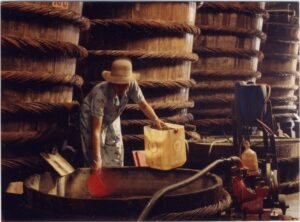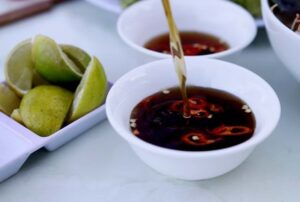“Collective injury”
Perhaps, before going into the “suspicion”, is Masan (the company that owns two brands of Chin-su and Nam Ngu) is the mastermind of creating a shocking “arsenic fish sauce” crisis for self-seeking? No, you may need to go through the economic literature to read a story about a classic theory of the “shock theory”.
Milton Friedman, the great tree of economics of the Chicago school, the father of this so-called doctrine, thinks that: only one crisis – real crisis, or perceived crisis – creates real change. When a crisis erupts, what actions are taken depends on ideas floating around.
When a crisis strikes, it is paramount to act immediately, make quick and “irreversible” changes, according to a distinguished professor at the University of Chicago.
It is likened to a variation of the 15th-century Italian theorist Niccolò Machiavelli’s command: “To hurt the most”. If you ignore the climax of the crisis to take action, there will be no other opportunity.
Taking advantage of disaster, crisis was a core idea in Milton Friedman’s theory and movement. Crisis and catastrophes are the raw materials to initiate a collective trauma on a large scale, in order to create change to profit as desired. The “catastrophic capitalists” always expect a crisis to be able to cook their own profits, there are cases where a crisis must be created.

Although Friedman’s economicism may apply to a certain part of democratic society, the key to this model is that in order to achieve maximum efficiency, conditions are required. dictatorial.
This doctrine is widely applied around the world, especially in public policy and public governance of states. In countries where Chicago’s policies have been in place for decades, a powerful governing coalition has emerged between a small number of large corporations and a wealthy political class. have.
Returning to the controversial story called “arsenic fish sauce”, I think the traces left in the media are against Masan – the unit is suspected of killing the traditional fish sauce. .
Strategies are arranged very methodically: an association (like VINASTAS) that has the name of protecting consumers stands out “publishes the results of scientific research”, then is so elaborate that it can distribute “reports. Press release, followed by a number of “strong” newspapers like Thanh Nien, and a force of facebookers that have many followers to disclose information …
Everything is like a sagging heavenly sag, made available to excite consumers, causing a “widespread injury” or “collective trauma” (as the scholar Milton Friedman uses) in an attempt to cause confusion. for consumers.
Immediately after this confusing information (in a very… obscure scientific form) was published, Masan immediately ran a campaign to advertise their products without arsenic… (in Thanh Nien newspaper). Immediately supermarkets and retail stores such as Fivimart stopped importing goods and at the same time, withdrew all suspicious items on sale shelves. It was a neat and quick way to kill an opponent. Those who have expertise in management strategy are not sure to draw this “tactical”.
I still wonder that, in the midst of the vast sky and earth, Vietnamese goods have the opportunity to go to every corner of the world, why are the goods of the same type playing rags with each other on the S-shaped land
From the perspective of studying communication strategy, I think this is a very malicious and dishonest way. In the literature on the crisis, there has been historically a story that people consider the crisis to be a trade, creating a crisis for profit, based on the initiative to prepare carefully its products. At that time, the crowd was like chess pieces controlled by dishonest players, wanting to make money from it.
The way they use the most is to create confusion, and they believe they can be the solution to ending the confusion by getting the crowd to buy their solution (product). Causing panic before “going to war” to expect victory is also one of the tactics in the art of military Ton Tu.
Crowd intelligence and “his stick beat his back”
With the support of the “dishonest media” (the letter of the Minister of Information and Communications Truong Minh Tuan), the campaign to bring down the traditional fish sauce has more or less achieved its goal. Consumers are confused about products that have been used for a long time, emotions are disturbed and “collective trauma”, most obviously, is confusion on social networks.
Many people believe that the unit that masterminds this case wants to “redefine the concept of fish sauce”. But they forget that, in addition to the negative aspects of social media such as “collective membership”, it has certain positives. In this case, social media is a gathering place for the wisdom of the crowd, they are suspicious and ask huge question marks about what’s going on behind the letters and “suspicious moves”.
Perhaps deliberately ignoring the past more than 10 years ago, Chin-su soy sauce was discovered by the Belgian Federal Food Safety Authority for the lofty 3-MCPD (carcinogen) content, to preach a philosophy. “delicious but safe” and their Chin-su products and Nam Ngu fish sauce that “meet arsenic safety standards” were ineffective. In other words, the above case, if they do, is causing the opposite effect, and facing all kinds of consequences in terms of business performance and legal.
With what they advertise, I think it is necessary to reverse the quality of their products. Specifically: according to scientific documents, any seafood (fish, shrimp …) has a certain amount of organic arsenic (arsenic), so the fish sauce that has inherent thousands of generations has organic arsenic. . But Masan advertises Chin-su, their Nam Ngu has no arsenic. So what is the so-called “fish sauce” that they advertise they are made of, if not from chemicals?
In addition, according to the Vietnamese dictionary (Institute of Linguistics, Da Nang Publishing House, 2005) the word “fish sauce” in Vietnamese means “food made of raw fish and shrimp, marinated with salt and left to gobble for a long time”, and “water fish sauce “is” a salty solution, with a deep sweet taste, drawn from the salted fish “. Masan’s things are eligible to be called fish sauce, need to be reviewed by regulators and consumers seriously.
The nature of the story must be understood to see the seriousness of the problem: killing traditional fish sauce gives the chance that fake fish sauce (chemical + water + salt) can rage. Then disease will follow, harming the health of the race.
I still wonder that, in the midst of the vast sky and earth, Vietnamese goods have the opportunity to go to every corner of the world, why are the goods of the same type playing ruffles with each other on the S-shaped land. I live and research in Europe, travel to many countries in Europe but find it very difficult to find a Vietnamese-branded fish sauce product.

Even in Germany, the number of Vietnamese is the largest in Europe, but expatriates also know the most about Thai fish sauce brands. The question is, if Chin-su and Nam Ngu are really that good, conquer the European market to raise the stature of Vietnam. Of course, in Europe, according to its strict standards, no one has allowed to circulate flavored chemicals as food. While dreaming of this, in the real world out there, the international community has been reading this shocking news through the English versions of domestic newspapers. Their confusion will be reflected in the sales of Vietnamese fish sauce exporters.
We are determined to boycott products with dishonest practices. For consumers, manufacturers should not expect illicit profits to bring to the community of clean products. With the authorities, should properly punish the role of deliberately making “turbid” to “fat” nefarious businesses, and strictly punish the units “dishonest media”.
Le Ngoc Son – Crisis management specialist, Ilmenau University of Technology, Germany
(Published on The Urban People newspaper, 04:52 | Thursday, November 3, 2016)
According to Le Ngoc Son
